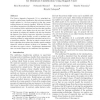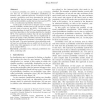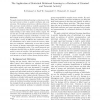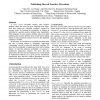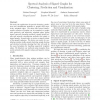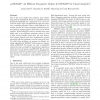SDM
2010
SIAM
15 years 2 months ago
2010
SIAM
The Passive Aggressive framework [1] is a principled approach to online linear classification that advocates minimal weight updates i.e., the least required so that the current tr...
149
click to vote
SDM
2010
SIAM
15 years 2 months ago
2010
SIAM
Given a collection of Boolean spatio-temporal(ST) event types, the cascading spatio-temporal pattern (CSTP) discovery process finds partially ordered subsets of event-types whose ...
103
click to vote
SDM
2010
SIAM
15 years 2 months ago
2010
SIAM
A relational probability tree (RPT) is a type of decision tree that can be used for probabilistic classification of instances with a relational structure. Each leaf of an RPT cont...
102
click to vote
SDM
2010
SIAM
15 years 2 months ago
2010
SIAM
Given large, multi-million node graphs (e.g., FaceBook, web-crawls, etc.), how do they evolve over time? How are they connected? What are the central nodes and the outliers of the...
123
click to vote
SDM
2010
SIAM
15 years 2 months ago
2010
SIAM
We apply statistical relational learning to a database of criminal and terrorist activity to predict attributes and event outcomes. The database stems from a collection of news ar...
SDM
2010
SIAM
15 years 2 months ago
2010
SIAM
A highly skewed microdata contains some sensitive attribute values that occur far more frequently than others. Such data violates the "eligibility condition" assumed by ...
104
click to vote
SDM
2010
SIAM
15 years 2 months ago
2010
SIAM
We introduce a novel Bayesian framework for hybrid community discovery in graphs. Our framework, HCDF (short for Hybrid Community Discovery Framework), can effectively incorporate...
131
click to vote
SDM
2010
SIAM
15 years 2 months ago
2010
SIAM
We study the application of spectral clustering, prediction and visualization methods to graphs with negatively weighted edges. We show that several characteristic matrices of gra...
109
click to vote
SDM
2010
SIAM
15 years 2 months ago
2010
SIAM
We present a method for unsupervised discovery of abnormal occurrences of activities in multi-dimensional time series data. Unsupervised activity discovery approaches differ from ...
SDM
2010
SIAM
15 years 2 months ago
2010
SIAM
